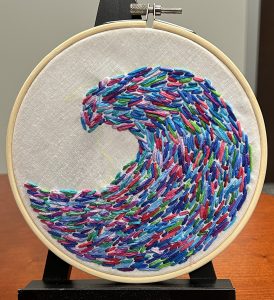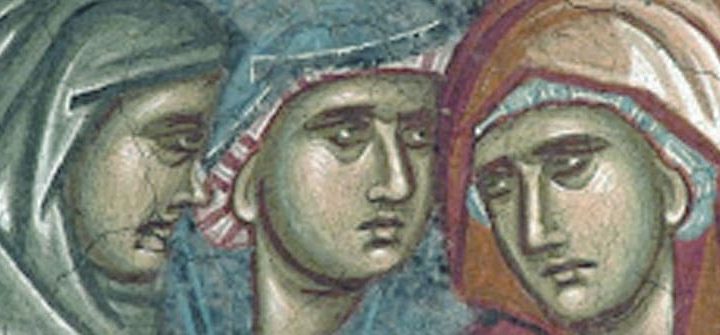As readers of Baptist News Global are aware, opponents of women in ministry often appeal to Scripture as the reason for women’s exclusion from pastoral leadership. Some well-meaning male ministers may even assert that if it were up to them, they would absolutely let women be pastors. Then they sigh and continue with, “But the Bible …”
But the Bible indeed. Now, I am not a biblical scholar, but I am a Baptist and, as a Baptist, I take the Bible very seriously.

Mandy McMichael
I take seriously that there are female prophets in the Bible. I take seriously that Phoebe, who was entrusted with carrying Paul’s letter to the Romans (and likely read it out loud), was a deacon in the early church. I take seriously that Priscilla and her husband hosted a church in their home. And that Paul referred to Junia as an apostle, praising her as well known among the apostles. I take the witness of their leadership very seriously.
I also take seriously the parts of the Bible that seemingly preclude women’s leadership and have wrestled with them perhaps as only a woman who is herself called to ministry can do. I am indebted to teachers who patiently listened to me and to gifted biblical scholars whose interpretations helped me read and understand such passages in context.
As someone who probably drove her Sunday school teachers crazy with my questions, I am grateful I found faithful Christians at every stage of the journey who welcomed my questions rather than dismissing them and me. My faith is stronger — and indeed possible — because of them.
“I am not interested in dismissing the Bible. But neither am I interested in dismissing the women whom the Spirit has gifted and called.”
So, to those individuals who want to say, “but the Bible,” I understand. And as I make very clear to my students, I am not interested in dismissing the Bible. But neither am I interested in dismissing the women whom the Spirit has gifted and called.
Not just the female leaders found in Scripture, but women today. Women like my students — those whose work and stories are featured in Baptist News Global, those discerning a call to ministry, those training for ministry, and those already serving in ministry.
To refrains of “but the Bible,” I respond, “but the women.” Their stories matter. Their gifts are God-ordained. They deserve opportunities to serve.
 Some, like Ashley, grew up in a tradition where women were welcomed at all levels of ministerial leadership. She reflected often on the impact having a woman as her senior pastor had on her understanding of church, faith and identity. Her painting of Pastor Debra walking with her through the stain-glassed ceiling is featured here.
Some, like Ashley, grew up in a tradition where women were welcomed at all levels of ministerial leadership. She reflected often on the impact having a woman as her senior pastor had on her understanding of church, faith and identity. Her painting of Pastor Debra walking with her through the stain-glassed ceiling is featured here.
Others who did not have such role models can struggle to imagine churches in which women lead. And yet, as they read and learn in community, they are like sponges, soaking in the truth of how women’s gifts have been used to build God’s kingdom. It is beautiful to watch them realize they do not have to reject power so as not to threaten male authority, to see them embrace their capacity to lead as a gift from God rather and to witness the freedom they experience when they are not fighting or fleeing the call of God on their lives.
These gifted young women sit in my classroom day after day. I see evidence of their abilities in the sermons they preach, Bible studies they write, retreats they plan and the other materials they prepare as part of their coursework.
Want to talk to children about women in ministry? One of my students designed coloring pages to introduce some of these women. Need an activity for the youth? Try the Women in Ministry Headbands game created by another. Wanting to connect with a group of college women discerning their call? Yet another student wrote a thought exercise to affirm truths about women and throw away the lies.
The church needs the gifts of these women.
The Southern Baptist Convention failed to pass the Law Amendment that would disfellowship churches that have women in pastoral roles. But as Meredith Stone, executive director of Baptist Women in Ministry, and others have reminded us, that does not mean the work is done. The SBC continues to disfellowship churches who have women serving in the role of “pastor” and to turn a deaf ear to women in their midst who have been abused.
“When someone inevitably uses the Bible as their trump card, we would do well to remember that usually it is not actually about the Bible.”
We must offer a different witness by listening to women, training women, hiring women and supporting women. When someone inevitably uses the Bible as their trump card, we would do well to remember that usually it is not actually about the Bible. It is about power reserved for men for centuries. Let us ask instead, “What about the women?”
 Ellie also grew up with a female pastor, not realizing it was controversial until she came to Baylor and some of her peers began to question her call. Her embroidery captures a sentiment expressed by Rev. Lockwood, who referred to the women in ministry movement as an ever-flowing wave in her interview with Ellie.
Ellie also grew up with a female pastor, not realizing it was controversial until she came to Baylor and some of her peers began to question her call. Her embroidery captures a sentiment expressed by Rev. Lockwood, who referred to the women in ministry movement as an ever-flowing wave in her interview with Ellie.
I end with these words from Ellie’s reflection: “Needle, thread, fabric and hoop can create any combination of products — stitched pictures, garments and more. The limit to the combination is found in the needle’s holder, not in the needle itself. The same is true of theology and interpreting the Bible; it is not the limitation of the Bible or the Lord’s will that confines the nature of leadership in the church, but in those who humanly define who or what is deemed ‘appropriate’ for church leadership. In these ways, those placed in leadership, and those who define what leadership is, are the lynchpin to creating change.”
And on that note, I say, let women lead.
Mandy McMichael serves as associate director and J. David Slover Assistant Professor of Ministry Guidance at Baylor University. She is currently building an oral history of Baptist Women in Ministry that will be housed at Baylor’s Institute for Oral History.


